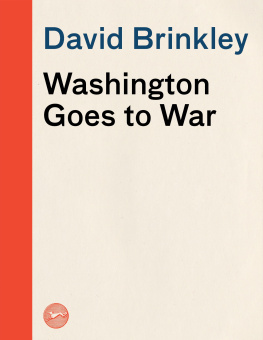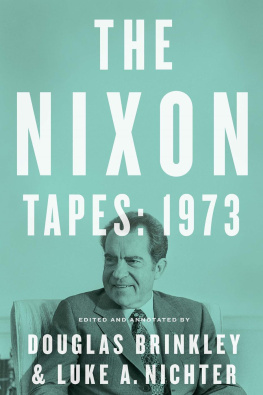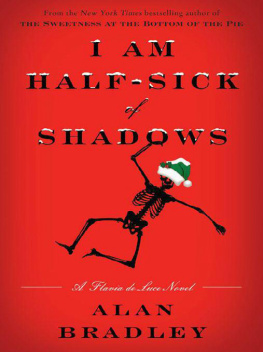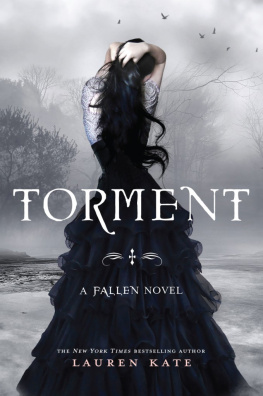Alan Brinkley - The Publisher: Henry Luce and His American Century
Here you can read online Alan Brinkley - The Publisher: Henry Luce and His American Century full text of the book (entire story) in english for free. Download pdf and epub, get meaning, cover and reviews about this ebook. year: 2010, publisher: Knopf, genre: Non-fiction. Description of the work, (preface) as well as reviews are available. Best literature library LitArk.com created for fans of good reading and offers a wide selection of genres:
Romance novel
Science fiction
Adventure
Detective
Science
History
Home and family
Prose
Art
Politics
Computer
Non-fiction
Religion
Business
Children
Humor
Choose a favorite category and find really read worthwhile books. Enjoy immersion in the world of imagination, feel the emotions of the characters or learn something new for yourself, make an fascinating discovery.

- Book:The Publisher: Henry Luce and His American Century
- Author:
- Publisher:Knopf
- Genre:
- Year:2010
- Rating:5 / 5
- Favourites:Add to favourites
- Your mark:
- 100
- 1
- 2
- 3
- 4
- 5
The Publisher: Henry Luce and His American Century: summary, description and annotation
We offer to read an annotation, description, summary or preface (depends on what the author of the book "The Publisher: Henry Luce and His American Century" wrote himself). If you haven't found the necessary information about the book — write in the comments, we will try to find it.
The Publisher: Henry Luce and His American Century — read online for free the complete book (whole text) full work
Below is the text of the book, divided by pages. System saving the place of the last page read, allows you to conveniently read the book "The Publisher: Henry Luce and His American Century" online for free, without having to search again every time where you left off. Put a bookmark, and you can go to the page where you finished reading at any time.
Font size:
Interval:
Bookmark:
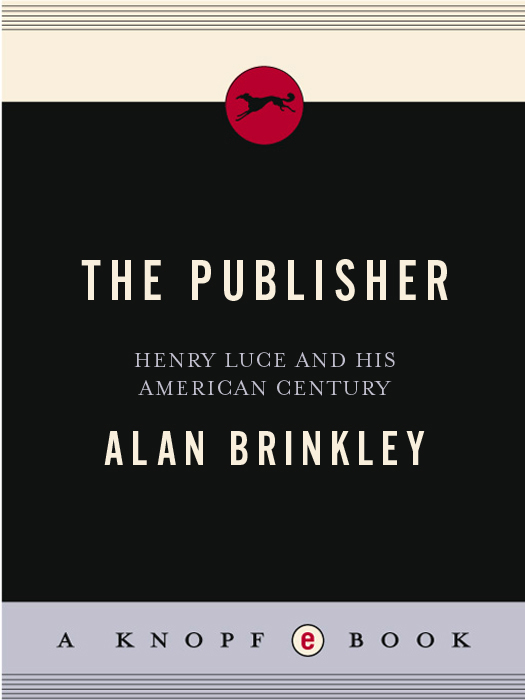
ALSO BY ALAN BRINKLEY
Voices of Protest:
Huey Long, Father Coughlin, and the Great Depression
The End of Reform:
New Deal Liberalism in Recession and War
The Unfinished Nation
Liberalism and Its Discontents
Franklin Delano Roosevelt
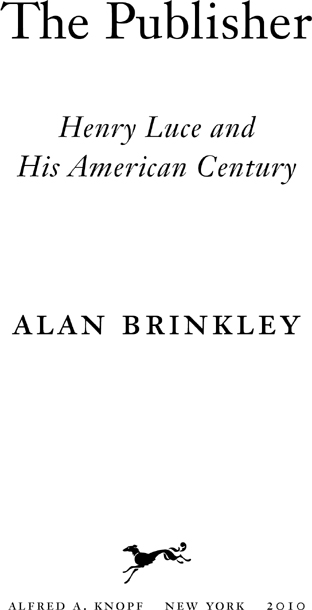
For Evangeline
I
II
III
IV
V
VI
VII
VIII
IX
X
XI
XII
XIII
XIV
In May 1966 Henry R. Lucecofounder of what became the largest and most influential magazine empire in Americaagreed to participate in an exclusive television interview for the first time in his life. Luce was then sixty-eight years old and had retired as editor in chief of Time Inc. two years earlier. But he remained a figure of fascination to many Americansall the more so because he was so seldom seen by the many people who were influenced, fascinated, and sometimes outraged by the contents of his magazines.
His interviewer was Eric Goldman, a Princeton historian who had recently worked in the Johnson White House and who now hosted an austere NBC program called Open Mind. Goldman was a courteous and respectful interviewer but not a tame one, and he pressed Luce on a number of controversial issues that had swirled around him through much of his life. Were the magazines Luce had launchedTime, Fortune, Life, and Sports IllustratedRepublican magazines? Was there an inherent conservative outlook in them? Did his own attitudes and convictions shape the contents of his magazines? Had he stepped over the line in promoting Republican candidates he had particularly admired and openly supportedWendell Willkie, Dwight Eisenhower? And most of all, did Luces many interventions in the debate over Americas international policies represent a kind of modern-day American imperialism?
Luce sat slouched in his chair through most of the hour, his clothes slightly rumpled, his tie askew, his pants pulled up over his crossed legs. He looked gaunt, and he had an alert, slightly restless demeanor. He rambled in conversation, often stopping in midsentence and starting over again, circling around questions before actually answering them, sometimes speaking so fast that he seemed to be trying to outrace the stammer that had troubled him in childhood and that occasionally revived in moments of stress. But he responded to Goldmans prodding without rancor. One gets the feeling, Goldman said, that you have a view of a kind of American mission in the world to go out and to bring these nations into a type of civilization much like our own. Lucewhose famous 1941 essay The American Century had said exactly thatnoted that his 1941 views had been shaped by the circumstances of World War II. But he did not refute Goldmans claim. Europe would not be able to lead the world in the sense it had for a couple of centuries, he said. The burden of leadership would fall more and more on the United States and this burden of leadership necessarily would want to be in the direction of those ideals which we presume to acknowledge.
As the conversation moved to Asia, Luces preoccupation through much of his life, his long-standing grievances became more apparent. He refuted Goldmans suggestion that other nations should pursue their own, different paths and that America should not be troubled by a Communist China. Although he admitted that there was little the United States could do in 1966 to topple the Communist regime, he continued to lament Americas earlier failure to save China when, he insisted, it had still been possible to do so. I think we [had] an obligation to restore Chiang Kai-shek to the position he had before the war, he said of the 1940s. It was by no means inevitable that China had to go Communist. He still could not excuse the American government.
One could have imagined a very different interview with Henry Luceone that would have focused on the extraordinary success of his magazines, the great power he had wielded as a result, the ideas for which he fought, the enormous wealth he had accumulated, the remarkable network of powerful people who had become part of his world, even his marriage to one of the most famous women in America. For decades he had been among the most influential men in Americacourted by presidents, feared by rivals, capable of raising some people to prominence and pulling others down. It must have been frustrating to him that his first (and only) television interview was dominated by the criticisms he had heard through much of his career. For as he neared the end of his life, what meant most to him was his effort to make a difference in historyto embrace a mission that would somehow justify his work and his life.
Like many Americans of my generation, I grew up with the Luce magazines without knowing very much about them. My parents read Time for years with consistent interest and frequent irritation. Life was the first magazine to which I subscribed. And a bit later, like many boys of my generation, I was an enthusiastic reader of Sports Illustrated. As I began my life as a historian, I encountered Luces The American Century. In the grim, antiwar climate of the 1970s, the essay seemed to me an obsolete relic of an earlier, more muscular, and now repudiated American age. Little did I know how soon its sentiments would be popular again.
Many years later, as I began thinking about writing a biography of Luce, I started reading a series of letters between the young Harry Luce and his father, a missionary in China. He and his family were seldom together after Harry began attending boarding schoolfirst in China, then in the United Statesstarting when he was ten years old. His family was a close one, and he sustained his relationship with them through an extraordinary correspondence that continued for years and introduced me to a remarkable young man. Luce was an ambitious child, just as he became an ambitious adult. He was a striver from his earliest years, always aware of his own formidable intelligence, never satisfied with his achievementsin school as in the later periods of his life. He was often a lonely boyfeeling abandoned in a British boarding school in China when he was young, marginalized at times as a scholarship student at Hotchkiss, unskilled in developing deep friendships and sustained intimacy. But in his letters home, at least when he was young, he revealed another part of himselfa person who was unafraid to reveal his weaknesses and failures, a young man who struggled not only to be successful, but also, like his revered father, to be virtuous. That struggle would be a part of him throughout his life. It was from my immersion in his early, remarkably documented life that I began to understand the man he would later become.
Luce was not alone among missionary children who became important public figures later in life. Like young Harry, many others were influenced by the shining example of their ambitious, virtuous parents and the great sacrifices they chose to make for their faith and for the improvement of others. And many missionary children, like Luce, went on to distinguished public careers in diplomacy, politics, academia, literature, and other influential endeavors.
One of the first major biographies of Luce, W. A. Swanbergs Luce and His Empirepublished in 1972, five years after Luces deathreflected the strong opinions many of Luces contemporaries had developed about him. It portrayed Luce as a relentless polemicist, whose magazines were more vehicles of propaganda and opinion than of reporting and journalism. In my copy of Swanbergs booka used one I picked up years ago at the Strand in New Yorksome earlier reader had written in pencil on the flyleaf: A great hatchet job, and 99 percent true.
Font size:
Interval:
Bookmark:
Similar books «The Publisher: Henry Luce and His American Century»
Look at similar books to The Publisher: Henry Luce and His American Century. We have selected literature similar in name and meaning in the hope of providing readers with more options to find new, interesting, not yet read works.
Discussion, reviews of the book The Publisher: Henry Luce and His American Century and just readers' own opinions. Leave your comments, write what you think about the work, its meaning or the main characters. Specify what exactly you liked and what you didn't like, and why you think so.


